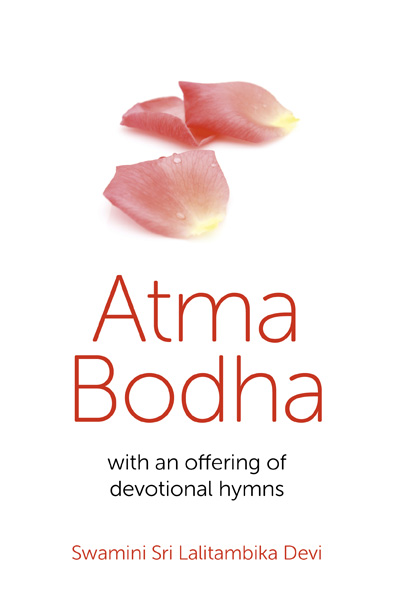Atma Bodha
Atma Bodha is Sankaracarya's classic introduction to Advaita Vedanta. This volume also includes devotional favorites.

Atma Bodha is Sankaracarya's classic introduction to Advaita Vedanta. This volume also includes devotional favorites.
Atma Bodha is Sankaracarya's classic introduction to Advaita Vedanta. This volume also includes devotional favorites.
Sacred writings
Who we are is not who we think we are. Truth is simpler than mind and deeper than thought. It cannot be learned but only experienced. When at once we awaken, our doubts are alleviated. All is one, beyond time, space, and causation. Such is the direct realization expressed through Advaita Vedanta. Sankaracharya is often called the father of Advaita Vedanta. His hymn Atma Bodha is a classic introduction that brings the pure seeker to liberation. This volume includes Atma Bodha with text and translation, as well as Bhaja Govindam, Hanuman Chalisa, Mahisasura Mardini Stotram, and other devotional favorites.
There is no greater joy, and there is nothing more to know. Such is realization of truth.
--Atma Bodha, Verse 54
Click on the circles below to see more reviews
The Atma Bodha is a beautiful Sanskrit Poem composed by the great Sad Guru Adi Shankara to lead sincere aspirants to Self Realisation. Because it was composed in Sanskrit, most translators have only been able to convey its meaning in prose, but here Swamini Sri Lalitambika Devi has inspiringly captured its full meaning in the most delightful modern free verse, yet remaining faithful to the text. I strongly recommend this book for those aspirants who require the necessary guidance, only obtained from the great Shankara, but here conveyed beautifully by the Swamini. This well presented book also contains a collection of inspiring devotional hymns and a transliteration of the Atma Bodha in the original Sanskrit. This book will prove to be a faithful companion for all those walking on the path of freedom, away from the dread cycle of birth and re-birth. ~ Alan Jacobs, President of the Ramana Maharshi Foundation UK
Upon reading the book titled: Atma Bodha - With an Offering of Devotional Hymns by Swamini Sri Lalitambika Devi, Dr Lorenzo da Costa writes how he enjoyed "a beautiful collection of seven sacred devotional hymns of the Hindu tradition. These particular Sanskrit poems are embedded in the popular Hindu psyche in the same way as The Lord’s Prayer, The Psalms and Ave Maria are embedded in the Christian psyche. "Atma Bodha is an ode to the God Shiva composed by Adi Shankara , a philosopher mystic of the first century associated with the Advaita Vedanta ( Non Duality) Tradition. This tradition underpins the Bhagavad Gita, which can be consided as the bible of Hinduism. "In Atma Bodha, a composition of 68 stanzas, Adi Shankara pledges his allegiance not to parents, spouse, children, occupation or any external form but only to Atman, The Soul of The Universe, who represents All-in One and One-in-All. Only through this mystic realisation Liberation ( Moksha) can be found. Atma Bodha is a hymn particularly sacred to Sanyasis or renunciates within the Hindu Tradition. "Bhaja Govindam is an ode to the God Vishnu, also attributed to Adi Shankara. In this composition of some 30 verses, Shankara emphasises the path of devotion (Bhakti Marg) , as a means of spiritual development leading to Moksha. This hymn is loved by devotional followers of both Vishnu and Shiva. "Madhurastakam is a hymn composed in devotion to the God Krishna. It is attributed to the philosopher, poet and saint Sripad Vallabhacharya, who lived in the fifteenth century. "Hanuman Chalisa refers to the very popular devotional hymn of forty verses in praise of Lord Hanuman. This is attributed to Tulsidas a poet-saint and philosopher of the sixteenth century. Hanuman, the Monkey God is among Hinduism’s favourite deities. It is said that there are more temples dedicated to Hanuman then any other deity in India. As Hanuman is also associated with the planet Saturn( Shani) in Indian Astrology ( Jyotish) recitation of the Hanuman Chalisa is believed to help in difficult circumstances and when in grave danger. "Lingastakam is an eight verse ode to Lord Shiva. The linga is a phallic symbol representing the divine male principle in the universe and is as representative of Shiva as his statue. Devotees who recite it hope to attain the blessings of Shiva. "Bhavanyastakam is another ode to Shiva in his form as Bhavani. Attributed to Adi Shankaracharya it is the foundation of the Sanyasi’s vow. The Sanyasi renounces allegiance to father, mother, brother, sister, wife ,children and the affairs of the world in general to take refuge in the higher unifying reality behind all things. Shiva is called the king of yogis and renunciants and represents the reality to which the sanyasi aspires. "Mahishasura Mardini Stotram is a hymn dedicated to the Goddess Durga, who represents the Divine Feminine and is worshipped particularly in eastern India. Here she is worshipped as the slayer of the demon Mahishasura. This is a story from the Devi Mahatmya text within the Markandeya Purana and symbolises the victory of good over evil. "These are excellent translations of popular devotional hymns and give a flavour of the devotional path within Hinduism. Shiva, Krishna, Hanuman, Durga and other deities are considered to be genuine living presences. These deities exist in the astral realm. Through devotional practices and rituals devotees hope to forge a connection which will give them guidance and help in spiritual and mundane affairs. Within Catholicism an analogy can be found in the cult of Mary, mother of Jesus and Queen of Angels." ~ Dr. Lorenzo Da Costa, Essex Spirit Guide